On Oct. 4, Washington University announced that it is adopting a need-blind admissions policy starting this application cycle. Many thought that the University’s unprecedented $5.7 billion endowment pool gains are what triggered the policy adoption. However, Chancellor Andrew Martin, in an interview, explained that this was not the case.
“We have always had the money. That was never an issue. It’s just that a few of us in the administration and on the Board of Trustees had children who were applying to college last year,” Martin said. “Now that our children have finished the college applications process, we have come to the consensus that it is time for the University’s admissions to become more equitable.”
“Don’t get me wrong, I’d never in a million years send my kids here as a first choice though,” continued Martin.
When asked why the administration chose now to go need-blind, Martin replied, “we wanted to save such an important announcement for when, inevitably, bad press came our way and we needed to save face. As soon as the flag thing happened, we decided, yeah, now’s a great time to become more socioeconomically diverse.”
Martin added, “next on our list is divestment. But we are saving that for when we do something really, really idiotic, like big time. You gotta milk these things, you know?”
Martin said that the policy adoption was bittersweet. “Yes, we did get some good press out of it. But I’m sure going to miss those dumber-than-a-rock Westchester students who would have never had anything close to a chance at getting accepted here, if not for their family’s money, that is. I hope Middlebury takes good care of them.
Martin explained that the faculty benefited greatly from the presence of these students in their classrooms.
“So many professors have been able to finish home renovations and take their families out for amazing vacations, all because of the bribery money from the Westchester students,” he said. “I know our faculty will miss them too.”
Students also shared mixed feelings about going need-blind, with many outright criticizing the policy.
The Danforth Dispatch, the University’s conservative publication that was recently in hot water for publishing an editorial saying that islamophobia during the flag scandal made campus culture more vibrant, published another editorial, calling need-blind admissions “just another example of liberal hypocrisy.”
“Are you serious?” the editorial wrote. “These liberals are getting so hypocritical it’s not even funny anymore. They keep talking about how we need more safe spaces for different groups of people and then support stuff like this. What about safe spaces for rich people?”
“So, minorities are allowed to be protected from racism, but we can’t be protected from poor people? Talk about cognitive dissonance,” the editorial continued.
The Office of Westchester Student Services (OWSS) says that they are dealing with an influx of student complaints about need-blind admissions.
“We hear you,” wrote Mark Horowitz, Director of OWSS, in an internal email. “We are working closely with the administration in order to come up with a compromise to ease some of your concerns.” Horowitz said in an interview that one idea that OWSS is tossing around is to have certain dorms where the floors will be separated by family federal income tax brackets.
Martin, acknowledging the growing student opposition to going need-blind, says that he has been meeting with Horowitz and wants to find a resolution as soon as possible.
“The dorm idea could work, if there is enough support for it,” Martin said.
When pushed on whether such an action would inadvertently lead to racial segregation as well, Martin simply replied, “it probably will. But that’s good news for everyone else because it means WashU will not only divest from fossil fuels but also commit to going carbon neutral.”
 WUnderground WashU's Premier (and only) satirical newspaper!
WUnderground WashU's Premier (and only) satirical newspaper!


